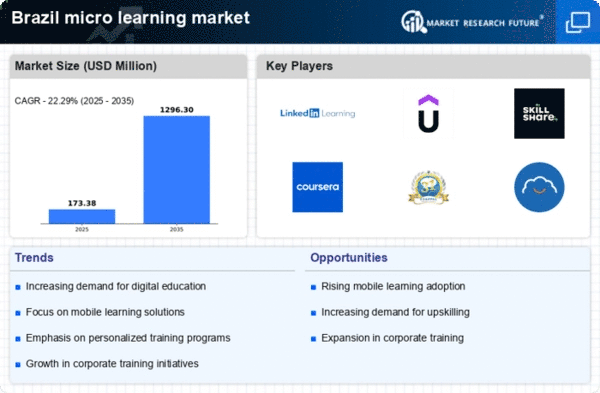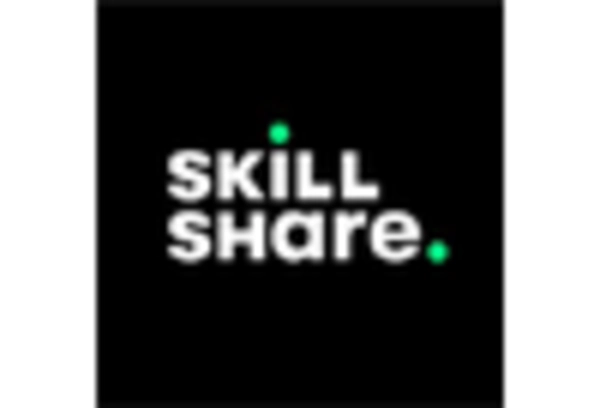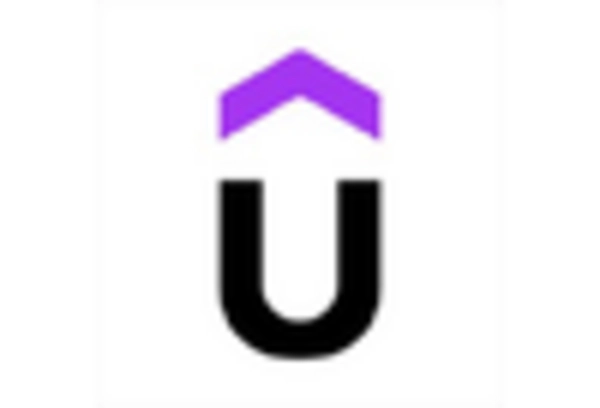Growing Popularity of Remote Work
The rise of remote work has a profound impact on the micro learning market in Brazil. As more organizations adopt flexible work arrangements, the need for effective remote training solutions becomes paramount. Micro learning provides an ideal format for remote employees, allowing them to engage with training materials in short, manageable segments. This trend is expected to drive the micro learning market's growth, with projections indicating an increase of around 17% in 2025. Organizations are recognizing that micro learning can bridge the gap in remote training, ensuring that employees remain engaged and informed regardless of their location. Consequently, the micro learning market is likely to see a surge in demand for content that is specifically designed for remote learning environments.
Emphasis on Employee Skill Development
The emphasis on employee skill development significantly influences the micro learning market in Brazil. As industries evolve and new technologies emerge, organizations are compelled to invest in continuous learning initiatives to keep their workforce competitive. Micro learning offers a practical solution, allowing employees to acquire new skills quickly and efficiently. In 2025, it is anticipated that the micro learning market will grow by approximately 20%, driven by the increasing recognition of the importance of upskilling and reskilling. Companies are leveraging micro learning to address skill gaps and enhance overall productivity. This focus on skill development not only benefits employees but also contributes to organizational success, making micro learning an essential component of corporate training programs in Brazil.
Increased Focus on Employee Engagement
Employee engagement is a critical factor influencing the micro learning market in Brazil. Organizations are increasingly aware that engaged employees are more productive and committed to their work. Micro learning serves as a powerful tool to enhance engagement by providing interactive and relevant content that resonates with employees. In 2025, the micro learning market is projected to grow by approximately 16%, as companies prioritize strategies that foster engagement through continuous learning. By integrating micro learning into their training programs, organizations can create a culture of learning that motivates employees to take ownership of their development. This focus on engagement not only benefits individual employees but also contributes to overall organizational performance, making micro learning a vital aspect of corporate training initiatives in Brazil.
Rising Demand for Flexible Learning Solutions
The micro learning market in Brazil experiences a notable surge in demand for flexible learning solutions. As organizations seek to enhance employee training and development, the preference for bite-sized content that can be accessed anytime and anywhere becomes increasingly evident. This trend aligns with the growing need for adaptability in the workforce, where traditional training methods may not suffice. In 2025, it is estimated that the micro learning market will witness a growth rate of approximately 15% annually, driven by the desire for on-the-go learning. Companies are recognizing that micro learning not only improves knowledge retention but also caters to the diverse learning preferences of employees. This shift towards flexibility is reshaping the landscape of the micro learning market, making it a pivotal component of corporate training strategies in Brazil.
Technological Advancements in Learning Platforms
Technological advancements play a crucial role in shaping the micro learning market in Brazil. The integration of artificial intelligence, machine learning, and data analytics into learning platforms enhances the personalization and effectiveness of micro learning experiences. These technologies enable organizations to tailor content to individual learning styles and preferences, thereby increasing engagement and retention rates. In 2025, the micro learning market is projected to expand significantly, with a compound annual growth rate (CAGR) of around 18%. This growth is largely attributed to the increasing availability of sophisticated learning management systems that facilitate the delivery of micro learning content. As organizations invest in these technologies, the micro learning market is likely to evolve, offering more interactive and immersive learning experiences that cater to the needs of the modern workforce.
















